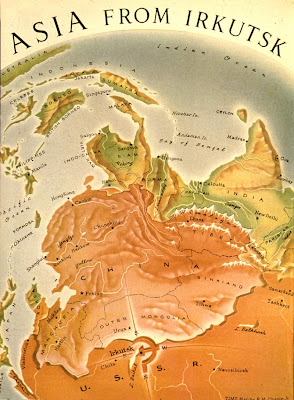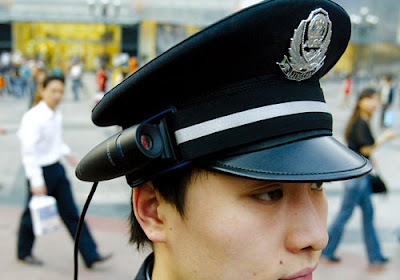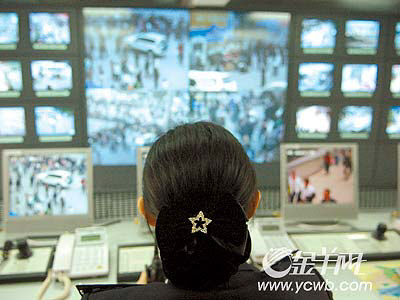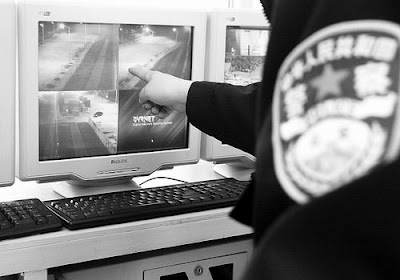For regularly updated translations of Chinese Twitter comments on the ongoing events in Tibet after March 15th, go here and here)
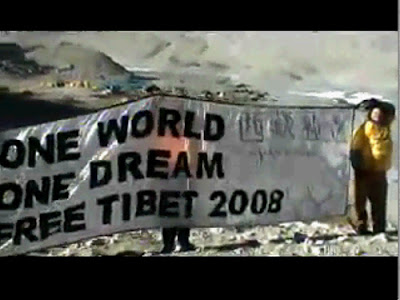 Image from Students for a Free Tibet flickr page, not currently firewalled
Image from Students for a Free Tibet flickr page, not currently firewalled
Some of you may already heard of the four members of Students for a Free Tibet (SFT) that have been detained for taking photos of themselves holding a banner at Mt. Everest base camp. The Chinese government is getting another taste of what’s to come as the Olympics drawing near: the wrath of Californians (two were from Sausalito, another from Boulder – which any Coloradan will tell you bitterly is full of Californians). Both the IOC Beijing chair Hans Verbruggen (who wants to not “be involved in any political issues”), and Thomas Laird, a journalist who wrote “The Story of Tibet” (in which one Amazon reviewer quips “Laird exhibits the standard Western devotee’s simplistic amazement at having his mind blown by Tibetan philosophy”), agree on one thing: there’s gonna be a whole lot more of these stunts protests.
And I expect everything to more or less continue in the same asanine way it has for nearly five decades. The photo above, to me, says it all: we don’t care about Chinese people. We don’t care what they think, we don’t care what they’ve suffered, we don’t give a damn about them. Sure, we’ll hastily scribble on some Chinese characters (“Oh shit, you mean in China not everybody reads English signs? Get me a magic marker and a dictionary!”), but the only message we care about is the one we get out to the English speaking world. Never mind the hundreds of millions of reasonably intelligent adult Chinese citizens and their opinion – no, the only opinions that matter about the future of Tibet are those of Westerners. It reeks of the condescension of 19th century missionaries and their need to rescue the “Sick Man of Asia”. The numerous Tibet activist websites, not to mention the government-in-exile, don’t have any Chinese language content on their websites, despite the Dalai Lama’s recent claims that he wants to negotiate anytime, anywhere. Of course they’re all behind the GFW, but should any Chinese netizen be intrepid enough to seek these pages out, they won’t find anything there for them. Apparently engaging the sympathies of the Chinese people just doesn’t matter. The misery of other ethnic groups besides Tibetans? That’s their problem. I find it deeply hypocritical that a movement deeply connected to Mahayana Buddhism, in which nobody gets Nirvana until everybody gets Nirvana, should be so narrowly concerned with only the plight of one ethnic group. Han Chinese people are tortured, imprisoned and oppressed for the same reasons as many Tibetans, and had their traditions and cultures abused and destroyed as well. But that’s not really the concern here, is it? Should Tibet ever become an independent nation, there doesn’t seem to have been any consideration for what negative consequences this might have for the rest of the population of the PRC. It’s not unlike the call for the Iraq War; give them freedom, and it will all work itself out. Not bloody likely.
This happened last summer as well. Tim Johnson of McClatchy newspapers blogged about a banner unfurled above a railway station in Beijing. This too was in English, and Western reporters in Beijing such as Tim were alerted beforehand. As he said at the time,
While the issues touching on Tibet are of interest, what troubled me is that the activists are generally Westerners rather than Tibetans. Their banner was in English, not Chinese or Tibetan, and few people in front of the train station took notice or were able to read the banner. So without complicit Western media to document the event, it would have gone unnoticed.
Of course, the Western media has a hard time ignoring a banner when the people holding it get arrested. It’s not clear what the charges are; it is possible, I suppose, that the protesters entered China without a visa from a Nepalese base camp. Tim Johnson recently crossed from the Chinese base camp to two others, risking a “$200 dollar fine, apparently negotiable down to $50.” That’s when you have a Chinese visa, of course. But the Chinese government plays right into the hands of the protesters by arresting them, getting their names splashed across international media. Otherwise the event would have never moved beyond the SFT webpage and a Youtube video. The Chinese government, besides pursuing thoughtless and brutal approach to Tibet (and the rest of the country), pursues a thoughtless and brutal approach to PR as well. And yet, they don’t get alot of flack for it from the Han majority. No one, however, seems to really consider why – they just assume that Chinese citizens are brainwashed zombies.
It’s not like Chinese citizens don’t notice the tone of cries for minority justice. In Xinjiang, where there’s another ethnic minority facing discrimination and oppression (the Uyghurs – not that the Tibetan exile movement has spent any time in half a century pointing them out), numerous Han Chinese complained bitterly to me about Western attention to minorities in China. “What about what we suffer? Minorities get all sorts of special privileges, like more than one child!”, they’d say. I find it incredibly ironic that they can also complain of Western imperialism and yet not show one iota of empathy for the feelings of Chinese minorities who feel their right to self-determination taken away by a more powerful alien society. Yet tactics like English banners inside the borders of the
PRC, which leave the Chinese population out of the conversation, only serve to more deeply entrench this bitterness. Mind you, there a different ways to try and engage the Chinese public, and I don’t recommend the phone spam approach of the Falun Gong/Epoch Times. These are not attempts at peaceful reconciliation or understanding, concepts the Dalai Lama has flogged in countless reams of dead trees – the entire problem is that there is no attempt to engage the other side as human beings, by exiles or the Chinese government. At least the Chinese government, however, makes no pretense at being stalwart defenders of universal human rights or deep spiritual empathy for all human beings.
 On the right: Dr. John Powers body checks the movement.
On the right: Dr. John Powers body checks the movement.
For 50 years, the Tibetan exile movement has fought a propaganda battle with the Chinese government, but never successfully brought that battle to China. Why? Because they’re too busy shouting and congratulating one another for it. And facts, for both sides, are only necessary when they support your side. In History as Propaganda: Tibetan Exiles versus the People’s Republic of China, Powers says (courtesy of ESWN):
Much of the discourse resembles a political rally in which competing factions yell slogans at each other from behind barriers that physically separate them. Our Chinese and Tibetan authors utilize a repertoire of historical simulacra — generally divorced from their context and stripped of the ambiguities that accompany them — that have been accepted by their respective communities as being concordant with the party line, and their conclusions follow from them…
In this situation, it seems impossible that either side could conceivably win its argument; on the other hand, neither can lose. So we are left with a stalemate, in which the two sides shout at each other and accuse their opponents of deliberately obfuscating, while overlooking their own obfuscations. As MacIntyre notes, when two polarized sides of protestors shout at each other, their messages are primarily aimed at those who already share their imaginings, and so each faction is essentially talking to itself or shouting slogans that are ignored or rejected by the other. Thus, each group ends up talking to itself and those who already agree with it.
When I first began this study, my background in Tibetan studies mostly consisted of philosophical and doctrinal studies with refugee Tibetan lamas. During my tenure in graduate school and in subsequent research trips to South Asia, I lived in Tibetan communities and developed friendships with a number of Tibetans. In this situation, my exposure to Tibetan history was heavily conditioned by their perspective, and I implicitly assumed that the authors of Chinese versions of Tibetan history particularly those related to the takeover of Tibet in the 1950s, must be aware that they were lying, distorting, and fabricating and that the Tibetan case for independence was so compelling that anyone with even the slightest exposure to the facts would reach that conclusion. The deplorable human rights situation in Tibet added weight to this conclusion. But in recent years, as a result of speaking with many Chinese, both in China and overseas, and reading a wide variety of publications by Chinese authors (both inside and outside the PRC), my inescapable conclusion is that they do sincerely believe the party line . This is true of most overseas Chinese, as well as residents of Taiwan, Hong Kong, and Macau. Their commitment to its veracity is as strong as that of the Tibetans to their own paradigm, and any problemization of it is generally viewed as dangerous, the crumbling edge of a slippery slope that leads to the destruction of the certainties that sustain the Chinese worldview and the Chinese state.
The certainty with which most Chinese accept their “regime of truth” with regard to Tibet should give pause even to the most passionate Tibet activist. Chinese people commonly assert that they have a valid perspective that has largely been ignored by a world that is either ignorant of the facts or deliberately misrepresents Chinese actions in Tibet. They claims that trying to present their case to pro-Tibet foreigners is like arguing with a brick wall — exactly the experience their opponents have with them. In this situation, it seems likely that both sides will continue to argue at cross-purposes, and it is difficult to imagine a resolution in light of the incommensurability of their respective premises and sources of evidence.
And so the yelling from both sides continues, and both sides can fire their zingers at one another and pat each other on the back. Powers examines the English literature produced by both sides, I believe, for a clear reason: because the battle is really one fought on Capitol Hill, not in China. Tibetan activists continue portraying the Chinese public as a swarm of indistinguishable drones incapable of independent thought or political power, even depicting them as foot soldiers in a massive campaign to dilute Tibet with faceless hordes, an outdated Cold War notion that suggests that all that CIA funding until the 1970s has left them in a time warp. No, the Free Tibet movement sees only the power of Washington D.C. and American corporations as capable of swaying China, though 50 years of a failed approach apparently isn’t enough to convince them they’re beating a dead yak. Meanwhile, the Chinese government must think of them as an annoying pain in the ass, constantly disrupting their diplomatic visits or causing PR headaches like this most recent stunt. But make no mistake, as long as the exile movement continues to ignore the Chinese people and look abroad for action, the PRC will be overjoyed. Go ahead and unfurl your banners in English at the Olympics, shout your slogans, treat Chinese people as brainwashed morons – they’ll love the Party even more. But hey, at least you can feel good about yourself back in Sausalito.

